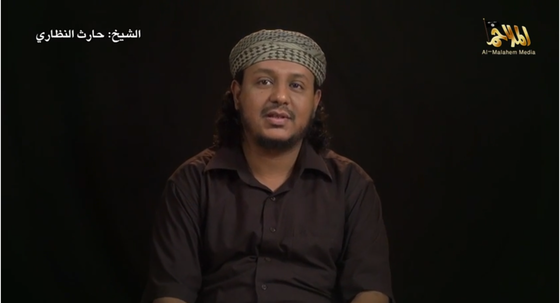A US drone strike in southern Yemen on Jan. 31 killed Harith bin Ghazi al Nadhari, a senior al Qaeda in the Arabian Peninsula (AQAP) sharia official. Nadhari’s death was confirmed in a “martyrdom” statement issued by the group via Twitter and other web sites earlier today.
Nadhari praised the attack on Charlie Hebdo’s offices just days after the massacre on Jan. 9. He did not claim responsibility for the operation, but another senior AQAP official subsequently did.
The AQAP statement announcing Nadhari’s death was translated by the SITE Intelligence Group. AQAP confirms that Nadhari worked for its sharia committee, and says that three other fighters were killed in the drone strike.
AQAP portrays the bombing that killed Nadhari as being part of a working agreement between the US and the Shia Houthis rebels who overran Yemeni government positions in recent weeks. The drone strike “came a few hours after the completion of the deal for the Houthis to take control of the administration of the country with an American and regional collusion,” the statement reads, according to SITE’s translation. “The Houthis have become a loyal partner to America in preserving its interests and executing its plans in the southern part of the Arabian Peninsula.”
The Houthis receive at least some support from Iran. And AQAP frequently claims that they are part of an alleged US-Iranian axis that is opposing Sunni Muslims throughout the region.
An influential al Qaeda ideologue
AQAP’s “martyrdom” statement identifies Nadhari as being a senior sharia official in the group, but says little else about his al Qaeda role.
The Long War Journal previously assessed that it is possible Nadhari also served as one of Nasir al Wuhayshi’s deputy general managers in al Qaeda’s global network. Documents recovered in Osama bin Laden’s compound show that al Qaeda’s general manager has deputies who are appointed to help him carry out his work. Nasir al Wuhayshi serves as both AQAP’s emir and as al Qaeda’s general manager, but his deputies have not been publicly identified.
Al Qaeda had consistently elevated Harith al Nadhari’s media profile, meaning he was considered a key ideologue for the global organization.
In addition to having his work promoted by AQAP, Nadhari’s writings have been featured in Nawa-e-Afghan Jihad (“Voice of the Afghan Jihad”), a magazine that publishes the works of top al Qaeda leaders and their closest allies. For example, an edition of the magazine published last year included a piece from Nadhari on “ideology and teachings.”
In addition to the Charlie Hebdo attack, Nadhari regularly commented on events far from Yemen. In August 2013, he discussed the turmoil in Egypt.
In July 2014, Nadhari joined other senior AQAP leaders in defending Ayman al Zawahiri and veteran jihadist ideologues against their critics. Nadhari’s message was clearly aimed at supporters of the Islamic State, an al Qaeda offshoot that claims to rule as a “caliphate” over large parts of Iraq and Syria. Nadhari was a staunch critic of the Islamic State and he released a series of statements attempting to undermine its legitimacy.
In October 2014, he was among the al Qaeda ideologues who attempted to portray the US-led bombing campaign in Iraq and Syria as part of a “Crusade” against the Islamic world. While preaching jihadist unity, Nadhari also issued a thinly-veiled critique of the Islamic State’s “caliphate” in the statement.
In January, Nadhari released guidelines for how jihadists should wage suicide operations. Al Qaeda has been attempting to rein in the violence carried out be its fighters, and his guidelines demonstrated the organization’s sensitivity to attacks that alienate the populace.
Shortly before his death, Nadhari joined nine other jihadist ideologues in releasing a statement that addressed defections to the Islamic State in the Caucasus. The statement was co-signed by two AQAP sharia officials, including Nadhari, as well as two sharia officials from the Al Nusrah Front, al Qaeda’s official branch in Syria.









1 Comment
well done & good riddance